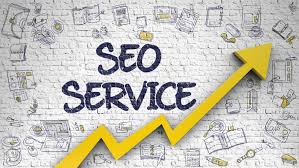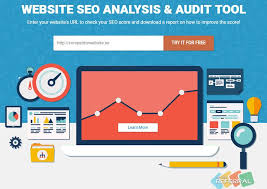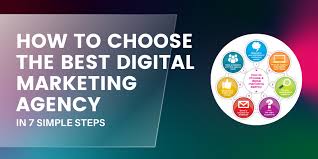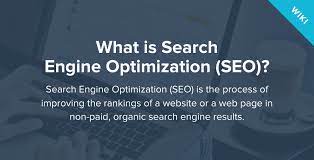The Power of Digital Marketing Agencies
The Power of Digital Marketing Agencies
In today’s fast-paced digital landscape, businesses are constantly seeking ways to stand out and reach their target audience effectively. This is where digital marketing agencies play a crucial role in helping businesses navigate the complexities of online marketing.
A digital marketing agency is a team of experts dedicated to crafting and implementing strategic online marketing campaigns tailored to meet the unique needs of each client. These agencies utilise a range of tools and techniques, such as search engine optimisation (SEO), pay-per-click (PPC) advertising, social media marketing, content creation, email marketing, and more to drive traffic, generate leads, and boost conversions.
Key Benefits of Partnering with a Digital Marketing Agency:
- Expertise: Digital marketing agencies consist of professionals with in-depth knowledge and experience in various aspects of online marketing. They stay updated on the latest trends and best practices to deliver effective strategies.
- Time-Saving: By outsourcing your digital marketing efforts to an agency, you can focus on other core aspects of your business while experts handle your online presence.
- Cost-Effective: Hiring a digital marketing agency is often more cost-effective than maintaining an in-house team. Agencies offer scalable solutions tailored to your budget.
- Data-Driven Results: Digital marketing agencies use analytics tools to track and measure the performance of campaigns, allowing for data-driven decision-making and continuous improvement.
- Creative Solutions: Agencies bring fresh perspectives and innovative ideas to the table, helping businesses differentiate themselves in a competitive market.
Choosing the Right Digital Marketing Agency:
When selecting a digital marketing agency for your business, it’s essential to consider factors such as their track record, client testimonials, range of services offered, communication style, and alignment with your business goals. A good agency will work collaboratively with you to develop strategies that drive results and align with your brand identity.
In conclusion, partnering with a digital marketing agency can provide businesses with the expertise, resources, and creativity needed to succeed in today’s digital world. By leveraging the power of online marketing channels effectively, businesses can expand their reach, engage their target audience, and achieve sustainable growth.
36 Essential Questions Answered: Navigating the World of Digital Marketing Agencies in the UK
- Is a digital marketing agency worth it?
- How much do you make as a digital marketing agency?
- Is a digital marketing agency still worth it?
- Who are the Big 6 digital agencies?
- What are the 7 types of digital marketing?
- How do I build a digital marketing agency?
- Who is the best digital marketing agency?
- Is digital agency a good business?
- Is it profitable to start a digital marketing agency?
- What are the 5 D’s of digital marketing?
- How many digital marketing agencies are in the UK?
- Is starting a digital marketing agency a good idea?
- What is digital marketing agency?
- Who uses digital marketing agencies?
- How do I start a digital marketing company?
- How do I start a digital marketing agency for my small business?
- What are the 4 types of digital marketing?
- What does a digital marketing agency need?
- Who needs a digital marketing agency?
- Do you need a digital marketing agency?
- What are the five steps to starting a digital marketing agency?
- What are the 4 functions of digital marketing?
- Which is the best digital marketing agency?
- What is the work of digital marketing agency?
- Do digital marketing agencies make money?
- What are the 7 types of digital marketing services?
- What are the 5 of digital marketing?
- What digital marketing agencies offer?
- What is a digital marketing agency?
- What is a digital marketing company?
- Who is No 1 in digital marketing?
- What are the big five digital agencies?
- Which digital agency is best?
- Is a digital agency a good business?
- How do I plan a digital marketing agency?
- How many digital marketing agencies are there in the UK?
Is a digital marketing agency worth it?
The question of whether a digital marketing agency is worth it is a common inquiry among businesses looking to enhance their online presence. The value of partnering with a digital marketing agency lies in the expertise, resources, and strategic approach they bring to the table. These agencies are equipped with professionals who are well-versed in the latest digital marketing trends and techniques, allowing them to craft tailored strategies that drive results. By outsourcing your online marketing efforts to a reputable agency, you can benefit from time-saving solutions, cost-effective services, data-driven results, and creative insights that can help your business stand out in a competitive digital landscape. Ultimately, investing in a digital marketing agency can be a wise decision for businesses seeking to maximise their online visibility and achieve sustainable growth.
How much do you make as a digital marketing agency?
The income of a digital marketing agency can vary significantly depending on various factors such as the size of the agency, the range of services offered, the client base, and the effectiveness of marketing strategies implemented. Digital marketing agencies typically generate revenue through a combination of service fees, project-based pricing, retainer agreements, and performance-based incentives. While some agencies may generate substantial profits through successful campaigns for high-profile clients, others may focus on serving smaller businesses with more modest budgets. Ultimately, the financial success of a digital marketing agency is determined by its ability to deliver value to clients and achieve measurable results in the ever-evolving digital landscape.
Is a digital marketing agency still worth it?
In the ever-evolving realm of digital marketing, the question of whether a digital marketing agency is still worth it remains a common one. The answer lies in the unique value that a reputable agency can bring to businesses seeking to enhance their online presence. With expertise in diverse digital marketing strategies, staying abreast of industry trends, and offering tailored solutions, a proficient agency can help businesses navigate the complexities of the digital landscape and achieve tangible results. By leveraging the skills and resources of a digital marketing agency, businesses can effectively reach their target audience, drive engagement, and ultimately boost their online visibility and growth potential.
Who are the Big 6 digital agencies?
In the realm of digital marketing, the term “Big 6 digital agencies” often refers to a select group of prominent and influential agencies that have made a significant impact in the industry. While the composition of this group may vary depending on different perspectives and criteria, some commonly recognised members include WPP, Omnicom Group, Publicis Groupe, Interpublic Group, Dentsu Inc., and Havas Group. These agencies have established themselves as leaders in providing a wide range of digital marketing services to clients worldwide, showcasing expertise in areas such as advertising, branding, media planning, and creative campaigns. Their collective influence and innovative approaches have helped shape the landscape of modern digital marketing practices.
What are the 7 types of digital marketing?
In the realm of digital marketing, there are seven key types that businesses often leverage to enhance their online presence and engage with their target audience effectively. These include search engine optimisation (SEO) to improve website visibility on search engines, pay-per-click (PPC) advertising for targeted online ads, social media marketing to connect with customers on popular platforms, content marketing to provide valuable and engaging content, email marketing for direct communication with subscribers, affiliate marketing for partnerships that drive traffic and sales, and influencer marketing to collaborate with influential individuals in the industry. Each type of digital marketing offers unique opportunities for businesses to reach their goals and connect with their audience in meaningful ways.
How do I build a digital marketing agency?
Building a successful digital marketing agency requires a strategic approach and a clear vision. To establish a digital marketing agency, start by defining your niche and target audience. Conduct thorough market research to understand industry trends, competition, and client needs. Develop a strong brand identity and value proposition that sets you apart from competitors. Invest in building a talented team with diverse skills in areas such as SEO, PPC, social media, content creation, and analytics. Create comprehensive service offerings that cater to the specific needs of your target clients. Establish strong relationships with clients through effective communication, transparency, and delivering measurable results. Continuously adapt to changes in the digital landscape and stay updated on emerging technologies and best practices to ensure the long-term success of your agency.
Who is the best digital marketing agency?
When it comes to determining the best digital marketing agency, the answer is not a one-size-fits-all solution. The “best” agency for a business depends on various factors such as the specific goals, budget, industry niche, and desired outcomes. What sets a digital marketing agency apart is its ability to understand and align with the unique needs of each client, deliver results-driven strategies, demonstrate expertise in relevant areas of online marketing, and provide excellent communication and support throughout the partnership. Ultimately, the best digital marketing agency is one that can effectively collaborate with a business to achieve its objectives and drive success in the ever-evolving digital landscape.
Is digital agency a good business?
The question of whether a digital agency is a good business is a common one among aspiring entrepreneurs looking to venture into the digital marketing industry. The answer largely depends on various factors, including market demand, competition, expertise, and business strategy. Digital agencies can be lucrative businesses if they offer valuable services, stay abreast of industry trends, and deliver measurable results for their clients. Success in the digital agency sector often hinges on a combination of creativity, technical proficiency, client relationships, and effective marketing strategies. With the right approach and dedication to excellence, a digital agency has the potential to thrive in today’s ever-evolving digital landscape.
Is it profitable to start a digital marketing agency?
Starting a digital marketing agency can be a profitable venture for those with the right skills, knowledge, and determination. The demand for online marketing services continues to grow as businesses increasingly rely on digital channels to reach their target audience. By offering valuable services such as SEO, PPC advertising, social media management, and content creation, a well-run digital marketing agency can attract clients and generate a steady stream of revenue. However, success in this competitive industry requires a solid business plan, effective marketing strategies, continuous learning to stay updated with trends, and a commitment to delivering high-quality results for clients. With dedication and a focus on providing exceptional value to clients, starting a digital marketing agency has the potential to be a profitable and rewarding endeavour.
What are the 5 D’s of digital marketing?
The 5 D’s of digital marketing encompass key principles that guide effective online marketing strategies. These include digital devices, referring to the variety of devices consumers use to access online content; digital platforms, highlighting the importance of selecting the right platforms to reach target audiences; digital media, focusing on the creation and distribution of engaging content across digital channels; digital data, emphasising the significance of data analytics in measuring and optimising marketing performance; and digital technology, which involves leveraging innovative tools and technologies to enhance marketing campaigns. Understanding and integrating these 5 D’s into digital marketing efforts can help businesses drive meaningful engagement, conversions, and growth in the online space.
How many digital marketing agencies are in the UK?
The number of digital marketing agencies in the UK is vast and continually growing to meet the increasing demand for online marketing services. With a dynamic and competitive market, it is challenging to provide an exact figure on the total count of digital marketing agencies operating in the UK. The industry encompasses a diverse range of agencies, from boutique firms focusing on specific niches to large-scale agencies offering comprehensive digital marketing solutions. Businesses seeking to partner with a digital marketing agency in the UK have a wide array of options to choose from, each with its unique strengths and specialisations tailored to meet varying business needs and objectives.
Is starting a digital marketing agency a good idea?
Starting a digital marketing agency can be a promising venture for those with a passion for creativity, strategy, and technology. With the increasing shift towards online platforms for marketing and advertising, the demand for digital marketing services is on the rise. However, like any business endeavour, success in establishing a digital marketing agency requires thorough planning, a solid understanding of industry trends, and a commitment to delivering exceptional results for clients. Those willing to invest time in building a strong reputation, cultivating relationships with clients, and staying abreast of evolving digital strategies can find great opportunities in starting a digital marketing agency. It’s essential to approach this decision with careful consideration and a clear vision of how to differentiate your agency in a competitive market.
What is digital marketing agency?
A digital marketing agency is a professional service provider that specialises in creating and implementing strategic online marketing campaigns for businesses seeking to enhance their digital presence. These agencies utilise a variety of tools and techniques, including search engine optimisation (SEO), pay-per-click (PPC) advertising, social media marketing, content creation, email marketing, and more to help businesses reach their target audience, drive traffic to their websites, generate leads, and ultimately increase conversions. By leveraging the expertise of a digital marketing agency, businesses can benefit from tailored strategies designed to improve their online visibility and achieve their marketing goals in the ever-evolving digital landscape.
Who uses digital marketing agencies?
Businesses of all sizes and industries utilise digital marketing agencies to enhance their online presence and reach their target audience effectively. From small startups looking to establish their brand online to large corporations seeking to expand their digital footprint, a diverse range of businesses benefit from the expertise and services offered by digital marketing agencies. E-commerce companies, service providers, B2B organisations, and even non-profit entities can leverage the specialised skills of these agencies to develop customised strategies that drive traffic, generate leads, and ultimately boost conversions. By partnering with a digital marketing agency, businesses can tap into a wealth of knowledge and resources to navigate the ever-evolving digital landscape and stay ahead of the competition.
How do I start a digital marketing company?
Starting a digital marketing company requires careful planning and strategic execution. To begin, it’s essential to define your niche and target market to differentiate your services in a competitive industry. Conduct thorough market research to understand the needs of potential clients and identify gaps you can fill with your expertise. Next, establish a strong online presence through a professional website and active social media profiles to showcase your capabilities. Building a talented team with diverse skills in areas like SEO, content marketing, social media management, and analytics is crucial for delivering comprehensive solutions to clients. Networking with industry professionals, attending relevant events, and staying updated on digital marketing trends will also help you establish credibility and attract clients. Finally, providing exceptional customer service and delivering measurable results will be key to building a successful digital marketing company that earns trust and loyalty from clients.
How do I start a digital marketing agency for my small business?
Starting a digital marketing agency for your small business requires careful planning and strategic execution. Begin by conducting thorough market research to identify your target audience, competitors, and unique selling points. Define your agency’s niche and services based on your expertise and the needs of your target clients. Develop a solid business plan outlining your goals, budget, pricing strategy, and marketing tactics. Build a strong online presence through a professional website, social media profiles, and content showcasing your capabilities. Invest in digital marketing tools and technologies to streamline operations and deliver results for your clients. Cultivate relationships with potential clients through networking, referrals, and consistent communication to establish credibility and grow your agency effectively.
What are the 4 types of digital marketing?
In the realm of digital marketing, there are four primary types that businesses often leverage to enhance their online presence and reach their target audience effectively. These include search engine optimisation (SEO), which focuses on improving a website’s visibility in search engine results; pay-per-click (PPC) advertising, where advertisers pay a fee each time their ad is clicked; social media marketing, which involves promoting products or services on various social media platforms; and content marketing, a strategy that revolves around creating and sharing valuable content to attract and engage audiences. Each type plays a distinct role in a comprehensive digital marketing strategy, offering unique benefits and opportunities for businesses to connect with their customers in meaningful ways.
What does a digital marketing agency need?
To operate effectively, a digital marketing agency requires a combination of key elements. Firstly, a skilled and diverse team of professionals is essential, including experts in areas such as SEO, PPC advertising, social media management, content creation, and data analysis. These specialists work together to develop comprehensive strategies tailored to each client’s unique goals. Additionally, access to cutting-edge tools and technologies is crucial for tracking campaign performance, analysing data, and staying ahead of industry trends. Clear communication channels with clients to understand their needs and provide regular updates on progress are also vital for building trust and delivering successful outcomes. Overall, a digital marketing agency needs a blend of talent, technology, collaboration, and client-centric focus to thrive in the competitive online marketing landscape.
Who needs a digital marketing agency?
In the ever-evolving digital landscape, the question of who needs a digital marketing agency is a common one. Businesses of all sizes and industries can benefit from partnering with a digital marketing agency to enhance their online presence and reach their target audience effectively. Whether you are a small start-up looking to establish your brand online, a medium-sized company seeking to increase website traffic and conversions, or a large corporation aiming to stay ahead of competitors in the digital realm, a digital marketing agency can provide tailored strategies and expertise to help you achieve your goals. By leveraging the specialised skills and knowledge of a digital marketing agency, businesses can navigate the complexities of online marketing with confidence and drive sustainable growth in today’s competitive market.
Do you need a digital marketing agency?
In the ever-evolving digital landscape, the question of whether you need a digital marketing agency is a common one for businesses looking to establish a strong online presence. Engaging with a digital marketing agency can be highly beneficial for businesses seeking to navigate the complexities of online marketing effectively. With their expertise, resources, and strategic approach, a reputable agency can help you reach your target audience, drive traffic to your website, generate leads, and ultimately boost conversions. By partnering with a digital marketing agency, businesses can leverage specialised skills and industry insights to stay ahead of the competition and achieve sustainable growth in the digital realm.
What are the five steps to starting a digital marketing agency?
Embarking on the journey of starting a digital marketing agency involves careful planning and strategic execution. The five essential steps to kickstart a successful digital marketing agency include defining your niche and target audience to differentiate your services, conducting thorough market research to understand industry trends and competition, creating a solid business plan outlining your goals and strategies, building a strong online presence through a professional website and social media platforms, and finally, networking with potential clients and industry professionals to establish credibility and grow your client base. By following these steps diligently, aspiring entrepreneurs can lay the foundation for a thriving digital marketing agency poised for success in the competitive online landscape.
What are the 4 functions of digital marketing?
In the realm of digital marketing, understanding the four key functions is essential for businesses aiming to maximise their online presence. The first function is customer engagement, where digital marketing strategies are employed to interact with and build relationships with target audiences across various online platforms. Lead generation is another crucial function, focusing on capturing potential customers’ interest and converting them into qualified leads through compelling content and targeted campaigns. Brand awareness plays a significant role in digital marketing by ensuring that a brand’s message reaches a wide audience, increasing recognition and visibility. Lastly, conversion optimization involves refining digital marketing tactics to enhance conversion rates and drive desired actions from website visitors, ultimately leading to increased sales and business growth.
Which is the best digital marketing agency?
When it comes to determining the best digital marketing agency, it’s important to consider a range of factors that align with your specific business needs and goals. The definition of “best” can vary depending on various criteria such as expertise in your industry, proven track record of success, innovative strategies, transparent communication, client testimonials, and the ability to deliver measurable results. Conducting thorough research, seeking recommendations, and scheduling consultations with different agencies can help you identify the digital marketing partner that best fits your requirements and can effectively drive your online marketing efforts to success.
What is the work of digital marketing agency?
A digital marketing agency is tasked with creating and executing strategic online marketing campaigns to help businesses enhance their online presence, reach their target audience, and achieve their marketing objectives. The work of a digital marketing agency typically involves a range of services, including search engine optimisation (SEO), pay-per-click (PPC) advertising, social media marketing, content creation, email marketing, and more. By leveraging various digital channels and techniques, these agencies aim to drive website traffic, generate leads, increase brand awareness, and ultimately boost conversions for their clients. With a focus on data-driven strategies and continuous improvement, digital marketing agencies play a vital role in helping businesses thrive in the competitive digital landscape.
Do digital marketing agencies make money?
Digital marketing agencies generate revenue by providing a range of services to clients, including SEO, PPC advertising, social media marketing, content creation, email campaigns, and more. These agencies typically charge clients based on various models such as project-based fees, retainer agreements, or performance-based pricing. By delivering effective digital marketing strategies that drive results for their clients, digital marketing agencies can generate income and sustain their operations. The ability of an agency to make money is often tied to its expertise, track record of success, and the value it delivers to clients through innovative and data-driven marketing solutions.
What are the 7 types of digital marketing services?
In the realm of digital marketing services, there are seven key types that businesses often leverage to enhance their online presence and engage with their target audience effectively. These include search engine optimisation (SEO) to boost website visibility on search engines, pay-per-click (PPC) advertising for targeted online ads, social media marketing to connect with audiences on various platforms, content marketing for valuable and engaging content creation, email marketing for direct communication with customers, influencer marketing to leverage influencers’ reach and credibility, and finally, affiliate marketing for partnerships that drive traffic and conversions. Each of these services plays a vital role in a comprehensive digital marketing strategy aimed at achieving business objectives and fostering growth in the digital landscape.
What are the 5 of digital marketing?
In the realm of digital marketing, understanding the fundamental pillars is essential for crafting successful online strategies. The five key components of digital marketing encompass search engine optimisation (SEO), pay-per-click (PPC) advertising, social media marketing, email marketing, and content creation. SEO focuses on enhancing website visibility in search engine results, while PPC involves paid advertising to drive targeted traffic. Social media marketing leverages platforms like Facebook and Instagram to engage audiences, while email marketing nurtures leads through personalised communication. Lastly, content creation involves producing valuable and relevant content to attract and retain customers. Mastering these core elements empowers businesses to effectively reach and connect with their target audience in the digital landscape.
What digital marketing agencies offer?
Digital marketing agencies offer a comprehensive range of services aimed at enhancing a business’s online presence and driving digital growth. These agencies provide expertise in various areas such as search engine optimisation (SEO), pay-per-click (PPC) advertising, social media marketing, content creation, email marketing, web design, and more. By leveraging these services, digital marketing agencies help businesses increase their visibility, attract targeted traffic to their websites, generate leads, improve brand awareness, and ultimately boost conversions. With a focus on data-driven strategies and innovative approaches, digital marketing agencies play a vital role in helping businesses navigate the ever-evolving digital landscape and achieve their online marketing goals effectively.
What is a digital marketing agency?
A digital marketing agency is a professional entity that specialises in providing comprehensive online marketing services to businesses seeking to establish a strong digital presence. These agencies leverage a variety of digital channels and strategies, including search engine optimisation (SEO), pay-per-click (PPC) advertising, social media marketing, content creation, email campaigns, and more, to help clients achieve their marketing objectives. By utilising their expertise and resources, digital marketing agencies assist businesses in expanding their online reach, increasing brand visibility, driving website traffic, generating leads, and ultimately boosting conversions. In essence, a digital marketing agency acts as a strategic partner that crafts tailored solutions to enhance a company’s online performance and overall success in the competitive digital landscape.
What is a digital marketing company?
A digital marketing company is a specialised agency that offers a range of online marketing services to help businesses promote their products or services on digital platforms. These companies employ experts in various digital marketing disciplines, including search engine optimisation (SEO), pay-per-click (PPC) advertising, social media marketing, content creation, email marketing, and more. By leveraging these tools and strategies, a digital marketing company aims to enhance a brand’s online visibility, attract targeted traffic to its website, generate leads, and ultimately drive conversions. With a focus on data-driven results and innovative solutions, digital marketing companies play a vital role in helping businesses navigate the complexities of the digital landscape and achieve their marketing objectives effectively.
Who is No 1 in digital marketing?
The question of who holds the top position in digital marketing is subjective and can vary depending on specific criteria such as industry expertise, client satisfaction, innovation, and overall impact. Numerous digital marketing agencies have garnered recognition for their exceptional work and results in the field. While it may be challenging to pinpoint a definitive “number one” agency, there are several leading agencies known for their creativity, strategic approach, and ability to deliver tangible results for their clients. Conducting thorough research and considering individual business needs are crucial in selecting the right digital marketing agency that aligns with your goals and objectives.
What are the big five digital agencies?
When it comes to the big players in the digital marketing agency landscape, the term “Big Five” often refers to some of the largest and most renowned agencies in the industry. These agencies are known for their global presence, diverse range of services, and impressive client portfolios. While the specific list may vary depending on different sources and perspectives, some of the agencies commonly recognised as part of the Big Five include WPP, Omnicom Group, Publicis Groupe, Interpublic Group, and Dentsu Group. These agencies have established themselves as industry leaders through their innovative strategies, creative campaigns, and ability to drive significant results for their clients on a global scale.
Which digital agency is best?
When searching for the best digital marketing agency, it’s essential to consider various factors that align with your specific business needs and goals. The “best” agency for one company may not necessarily be the best fit for another. Look for an agency with a proven track record of success, expertise in your industry or niche, a comprehensive range of services that match your requirements, transparent communication practices, and a collaborative approach to working with clients. Ultimately, the best digital agency is one that understands your brand vision and can tailor their strategies to help you achieve tangible results in the ever-evolving digital landscape.
Is a digital agency a good business?
When considering whether a digital agency is a good business, it’s important to recognise the growing significance of online presence in today’s business landscape. A digital agency can be a lucrative venture for those with a passion for digital marketing and a knack for creativity and strategy. With the increasing demand for online marketing services, a well-run digital agency has the potential to thrive by helping businesses enhance their visibility, reach their target audience effectively, and achieve their marketing goals. Success in the digital agency business often hinges on staying abreast of industry trends, delivering innovative solutions, and building strong client relationships based on trust and results.
How do I plan a digital marketing agency?
Planning a digital marketing agency requires careful consideration of various key aspects. To begin, it is essential to define your agency’s niche and target market to differentiate yourself in the competitive landscape. Conducting thorough market research and competitor analysis can provide valuable insights into industry trends and opportunities. Next, establish a clear business plan outlining your agency’s goals, services offered, pricing structure, and marketing strategies. Building a talented team of digital marketing experts with diverse skills and expertise is crucial for delivering high-quality services to clients. Additionally, investing in technology tools and staying updated on the latest digital marketing trends are essential for staying ahead in the dynamic industry. Regularly evaluating and adjusting your agency’s strategies based on performance metrics and client feedback is key to long-term success in the ever-evolving digital marketing sector.
How many digital marketing agencies are there in the UK?
The number of digital marketing agencies in the UK is constantly evolving due to the dynamic nature of the industry. As of recent estimates, there are thousands of digital marketing agencies operating across the UK, offering a diverse range of services to cater to the needs of businesses in various sectors. The competitive landscape continues to grow as more agencies emerge, each with its unique strengths and specialisations. When choosing a digital marketing agency in the UK, it’s essential for businesses to conduct thorough research, consider their specific requirements, and select an agency that aligns with their goals and values for successful collaboration and results-driven outcomes.









